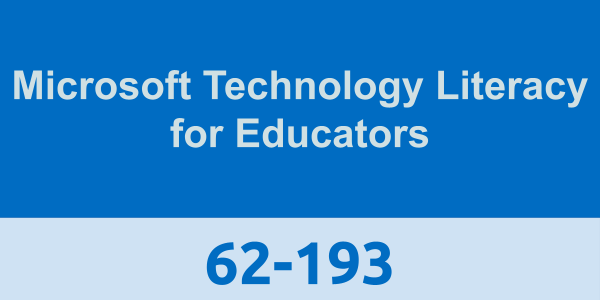The MCE: Technology Literacy for Educators certification test is an intermediate-level examination intended to be a valid and reliable measure of competencies as measured by the 21st Century Learning Design (21CLD) framework.
Microsoft Technology Literacy for Educators Exam Summary:
| Exam Name | Microsoft Certified Educator (MCE) - Technology Literacy for Educators |
| Exam Code | 62-193 |
| Exam Price | $127 (USD) |
| Exam Price | 45 mins |
| Number of Questions | 40-60 |
| Passing Score | 700 / 1000 |
| Sample Questions | Microsoft Technology Literacy for Educators Sample Questions |
| Practice Exam | Microsoft 62-193 Certification Practice Exam |
Microsoft 62-193 Exam Syllabus Topics:
| Topic | Details |
| Facilitate Student Collaboration | |
| Determine the level to which a learning activity meets the rubric for collaboration | - prepare activities that enable students to work together, have a shared responsibility for deliverables, make decisions that are substantive and crucial to learning activity success, and work interdependently. - analyze, evaluate, design, and manage the learning environment to facilitate student collaboration, given a set of resources available in a classroom. - virtual environment; physical environment; software tools available. |
| Facilitate Skilled Communication | |
| Modify a learning activity to meet the rubric for the highest level of skilled communication | - prepare activities that enable students to create product deliverables that convey a set of connected ideas, are multimodal, require supporting evidence, and are designed for a specific audience. |
| Evaluate student product examples to determine the level to which they meet the skilled communication rubric | - evaluate student product examples on the use of connected ideas, multimodal approach, supporting evidence, and design for a specific audience. |
| Facilitate Knowledge Construction | |
| Determine the level to which a learning activity meets the knowledge construction rubric | - prepare interdisciplinary activities that enable students to apply knowledge in a new context |
| Transform a didactic learning situation into an activity that requires students to apply knowledge in a new context that facilitates interdisciplinary learning | - prepare activities that enable students to spend their time and effort developing knowledge that is new to them and participate in interdisciplinary learning activities. |
| Facilitate Self-Regulation | |
| Determine the level to which a learning activity meets the rubric for self-regulation | - prepare long-term activities that enable students to plan their own work and revise work based on feedback. |
| Determine which opportunities facilitate an environment of self-regulation | - provide students with opportunities to set their learning goals, decide on the best strategies to achieve these goals, and monitor to see if these strategies are working. |
| Facilitate Real World Problem Solving and Innovation | |
| Determine the level to which a learning activity meets the rubric for real world problem solving | - prepare activities that enable students to develop a solution to a problem that is new to them, complete a task that they have not been instructed how to do, or design a complex product that meets a set of requirements. |
| Select a strategy to encourage students to problem-solve, innovate, and apply a solution that benefits others in the real world | - develop learning objectives that involve real-world issues. |
| Facilitate Student use of Information and Communication Tools (ICT) | |
| Determine the level to which a learning activity meets the rubric for use of ICT learning | - prepare activities that enable students’ use of ICT to support knowledge construction; address the needs of diverse learners. |
| Fulfill student learning outcomes by using Microsoft technology tools | - identify the skills required to implement the resources. |
| Select the best ICT resource to help resolve or manage the logistical challenges of reaching the desired educational outcome | - Lab configuration issues; shared computers; BYOD. |
| Use ICT to be an Effective Educator | |
| Determine which ICT resource supports a specified educational outcome | - evaluate a learning activity; rate the appropriateness of specific ICT resources; address the diverse needs of all learners. |
| Determine the appropriate pedagogical approach to meet an educational outcome using ICT resources | - planned vs. unplanned situations; appropriate performances of understanding; different learning styles. |
| Select an appropriate ICT resource to reach a professional development goal | - improve productivity; time management skills. |
| Evaluate responses to a scenario involving Digital Citizenship | - internet safety; security issues; cyber-bullying; digital footprint; privacy issues; communication forums; acceptable use. |





0 comments:
Post a Comment